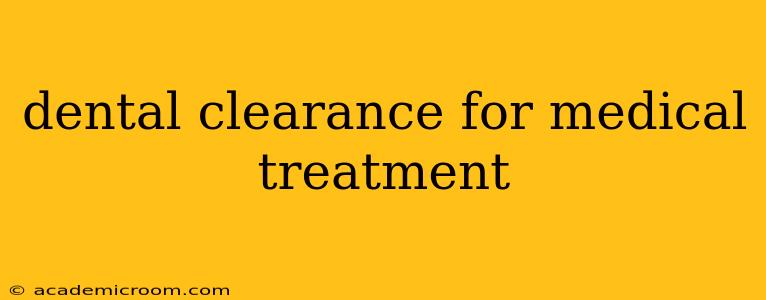Getting medical treatment often requires a dental clearance, especially for procedures involving significant risk or those requiring general anesthesia. This comprehensive guide explores the reasons behind dental clearance, the process involved, and answers frequently asked questions surrounding this crucial aspect of pre-operative care.
Why is Dental Clearance Necessary Before Medical Treatment?
Dental clearance is a critical step in preparing for certain medical procedures because of the potential risks associated with oral infections. Untreated dental problems, such as gum disease (periodontitis) or infected teeth, can lead to serious complications during and after surgery or other medical interventions. These complications can range from increased risk of infection at the surgical site to potentially life-threatening conditions like bacteremia (bacteria in the bloodstream).
What Types of Medical Procedures Typically Require Dental Clearance?
Many procedures necessitate dental clearance, particularly those involving:
- Major surgery: Procedures requiring general anesthesia or prolonged hospitalization.
- Organ transplantation: To minimize the risk of infection impacting the transplant's success.
- Joint replacement: Infection is a major concern after joint replacement surgery.
- Cardiac procedures: Minimizing risk of infection is paramount in heart surgeries and other cardiac procedures.
- Cancer treatments: Patients undergoing chemotherapy or radiation therapy often require dental clearance to prevent complications.
What Does a Dental Clearance Involve?
The process typically begins with a consultation with your dentist. This consultation will involve:
- A thorough examination: The dentist will check for cavities, gum disease, loose teeth, and any other oral health issues.
- X-rays (if necessary): To identify any underlying problems not visible during a visual examination.
- Treatment of existing problems: Any active infections or significant dental issues will need to be addressed before clearance can be granted. This may involve extractions, fillings, scaling and root planing, or other necessary treatments.
- Issuance of a clearance letter: Once all issues are addressed, the dentist will provide a letter confirming dental clearance for the medical procedure.
How long does it take to get dental clearance?
The time required varies depending on the complexity of any necessary dental work. Minor issues might be resolved quickly, while more extensive treatments could take several weeks or even months. It’s crucial to initiate the dental clearance process well in advance of your scheduled medical procedure.
What if I have a dental emergency?
If you experience a dental emergency, such as severe pain or swelling, contact your dentist immediately. Explain that you require dental clearance for an upcoming medical procedure, and they will prioritize your care.
What happens if I don’t get dental clearance?
Failing to obtain dental clearance can significantly increase the risk of complications during and after your medical procedure. In some cases, the medical procedure may even be postponed or canceled until appropriate dental care is provided. This delay can create further complications and additional stress.
Who should I contact to get a dental clearance?
Contact your regular dentist. If you don’t have a regular dentist, your primary care physician or the medical facility where you are receiving treatment can recommend one.
Are there specific things I should tell my dentist during the consultation?
Ensure you inform your dentist about the type of medical procedure you’re undergoing and the date of the procedure. This allows them to assess the urgency of any necessary dental work and prioritize your care accordingly.
Conclusion: Prioritizing Oral Health for Optimal Medical Outcomes
Dental clearance isn't just a formality; it's a vital step in ensuring the safety and success of many medical procedures. By proactively addressing any existing dental problems, you can significantly reduce the risk of complications and contribute to a smoother, more successful medical outcome. Remember to schedule your dental consultation well in advance of your planned medical treatment. Proactive oral health is an important component of overall well-being.
